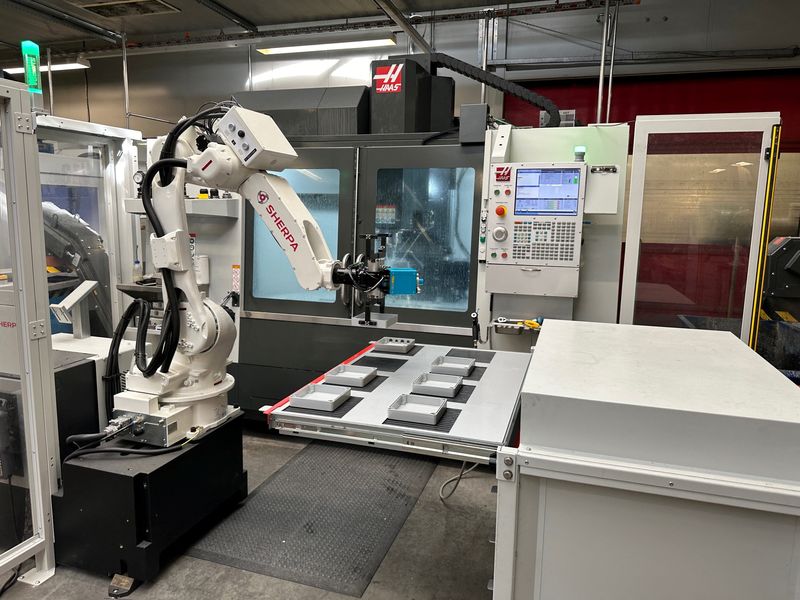(This Oct. 27 story has been corrected to change the name of the Daimler (OTC:MBGAF) Truck works council chairman to Michael Brecht, not Matthias Krust, in paragraph 23)
By Maria Martinez
BERLIN (Reuters) - At machine parts producer S&D Blech, the head of the grinding unit is retiring. With Germany's acute labour shortage leaving few candidates to take on the skilled but dirty and hazardous manual work, the company will replace him with a robot.
Other small and medium-sized companies are also turning to automation as the gradual exit from the workplace of Germany's post-war "baby boom" generation tightens the labour squeeze.
Some 1.7 million German jobs were unfilled in June, official data shows. The German Chambers of Commerce and Industry (DIHK) says more than half of companies are struggling to fill vacancies, at an estimated cost to growth in Europe's largest economy of nearly 100 billion euros ($109 billion) per year.
Managing director Henning Schloeder cited that trend to explain S&D Blech's push over several years towards automation and digitalisation, saying: "This will further aggravate the already difficult skilled labour situation, particularly in production and crafts."
Finding a new head of the grinding unit was hard "not only because of all the experience he has, but also because it's a back-breaking job that no one wants to do any more", Schloeder told Reuters.
Machine-grinding involves high heat and continuous noise, while the sparks it throws out can be dangerous.
More women working and a surge in immigration have helped compensate for demographic changes in recent years in Germany.
But with baby boomers retiring and a new cohort - much smaller, due to low birth rates - joining the labour force, the Federal Employment Agency expects the pool of workers to shrink by 7 million people by 2035.
With similar shifts affecting other developed economies, the impact of advanced automation technologies from robotics to AI will be widely felt, said Nela Richardson, chief economist at global payrolls and HR services provider ADP.
"Long term, all those innovations are a game-changer for the world of work. Everybody will do their job differently," she told Reuters.
Heavy investment in automation by car makers and other industrial giants means Germany is already the world's fourth-biggest market for robots, and the largest in Europe.
But as robots become cheaper and easier to operate, the often family-run Mittelstand companies that are the country's economic backbone are also using them, from manufacturers like S&D Blech to bakeries, laundries and supermarkets.
According to the International Federation of Robotics around 26,000 units were installed in Germany last year - a figure surpassed only in 2018, before the COVID-19 pandemic slowed what had been an average of 4% annual growth.
"Robots enable the survival of companies that see their future at risk due to staff shortages," said Ralf Winkelmann, managing director of FANUC Germany, which sells about half its Japanese-made robots to small and medium-sized enterprises.
Ralf Hartdegen, whose consulting firm guides firms through this type of transition, said companies keen to automate but reluctant to fire people were increasingly basing their plans around the shedding of workers through retirement.
Family-run ROLEC, which produces systems to protect industrial electronics and control equipment, bought its first robot last year, to allow production to continue at night. The company has already acquired a second machine and plans to continue investing in automation.
"It is great when you turn on the light in the morning and the parts are in the storage container and have been processed," CEO Matthias Rose told Reuters.
Increasing automation also reflects the fact that robots have become easier to use, with no programming skills required. Most now come with a Human Machine Interface (NASDAQ:TILE), a touchscreen similar to a smartphone, said Florian Andre, a co-founder of SHERPA Robotics, a start-up that focuses on companies with between 20 and 100 employees.
Even workers and trade unions, once fearful of job losses, take an increasingly positive view. A survey published by robots marketplace automatica in June found nearly half of German employees see robots as helping to address labour shortages.
ROLEC's Rose said its initial venture into automation in 2022 had come as a big backlog of orders meant employees had to work overtime and on Saturdays. "It was a good starting situation for our first robot, as it was seen as a helper instead of as competition," he added.
A spokesperson for Germany's powerful IG Metall trade union said robots adopted as part of a long-term corporate strategy, rather than to cut costs quickly, can help make work "healthier, more interesting and safer".
Lorry and bus manufacturer Daimler Truck makes extensive use of robotics, particularly to help with heavy lifting and other challenges to workers' physical health.

"But there is nothing more flexible than a human," said Michael Brecht, chairman of the company's works council.
"The more complex the production, the more differentiated, the harder it becomes to use robots."